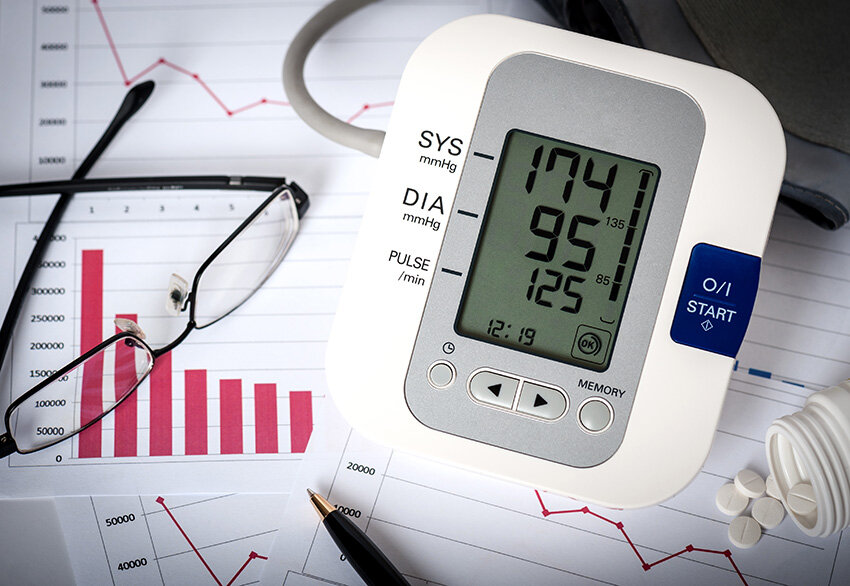Hypertension
What is Hypertension?
Hypertension (high blood pressure) is a condition where the pressure of blood through the arteries is higher than normal. We measure blood pressure by taking two measurements – when the heart muscle is contracting with beats (maximum pressure) and relaxed between beats (minimum pressure). Normal blood pressure is within the range of 100–140/60–90 in a person at rest. High blood pressure is usually diagnosed if this measure is often above normal range (140/90).
Keeping blood pressure under control is important if you want to stay healthy. Serious medical conditions like stroke, heart attack, heart failure and aneurysm all have hypertension as a major risk factor.
What causes hypertension?
Stress – poorly managed stress can increase the risk of developing high blood pressure
Age – people over 60 are more likely to develop high blood pressure as the arteries get stiffer and narrower with plaque build-up
Gender – men are at higher risk than women (men over 45 / women over 55)
Family history and background – some ethnic backgrounds and a family history can make you more prone to hypertension
Obesity – being overweight or obese is a major risk factor
Smoking and alcohol – regularly consuming large quantities of alcohol or tobacco can increase blood pressure
Diet and exercise – leading an inactive lifestyle or eating a high salt, high fat diet can increase your risk
Other health conditions – cardiovascular disease, diabetes, chronic kidney disease and high cholesterol levels can lead to hypertension, especially as you get older
What are the symptoms of hypertension?
Hypertension is dangerous because it can damage the heart, blood vessels and other organs (eg your kidneys) without any signs or symptoms. In severe cases, hypertension may cause sweating, anxiety, sleeping problems and blushing. If high blood pressure becomes a hypertensive crisis, headaches and nosebleeds might be present. But these symptoms are rare. That’s why it’s so important that you get your blood pressure checked regularly.
How do you diagnose hypertension?
Having high blood pressure for a short time can be a normal response to many situations. Acute stress and intense exercise, for example, can briefly elevate blood pressure in an otherwise healthy person.
Long term hypertension is much more dangerous. Regular blood pressure monitoring can help avoid severe complications like heart failure and heart attacks, aneurysm (a bulge in the wall of an artery that can burst), kidney failure and stroke. A simple test with a blood pressure monitor can help you keep track of your blood pressure – either through a visit to your doctor or by using blood pressure monitor at home.
How you do treat Hypertension?
If you’ve been diagnosed with high blood pressure, the first line treatment is to make some adjustments to your lifestyle:
Get more exercise – 30 mins moderate exercise 5 days per week is recommended
Monitor your blood pressure – track any changes using a home blood pressure monitor
Reduce stress – try various relaxation techniques to help manage your stress
Stop smoking – smoking can increase blood pressure. Talk to your doctor for help to quit today.
Eat well – nurture your body with healthy foods and avoid alcohol, drugs and foods high in salt or fat
Manage body weight – maintain a healthy weight and eat a balanced diet that matches your age, gender and activity level
Take medication – specific medications are used to manage high blood pressure – usually a low dose at first, which may be combined to include two or more drugs in the longer term

